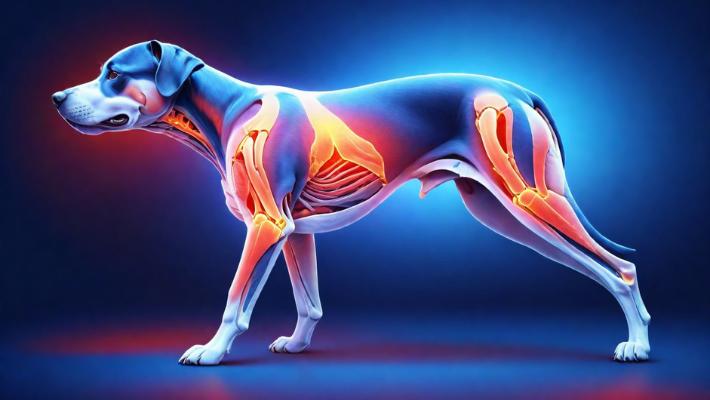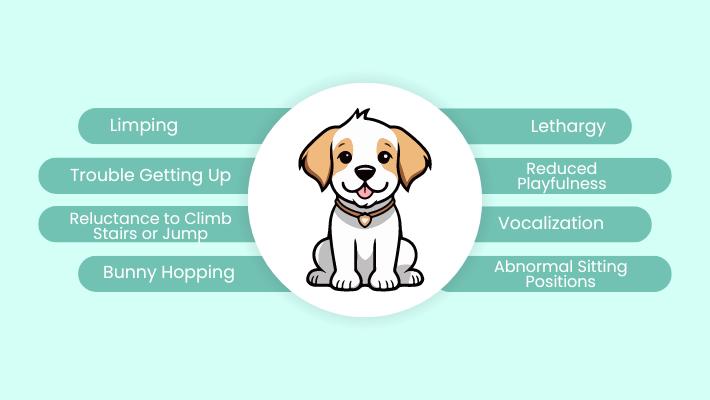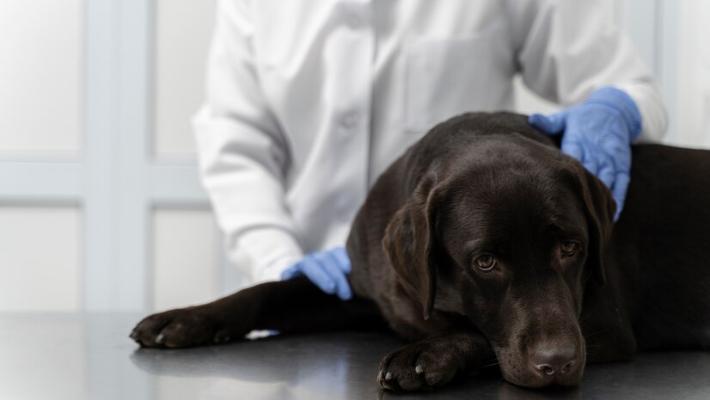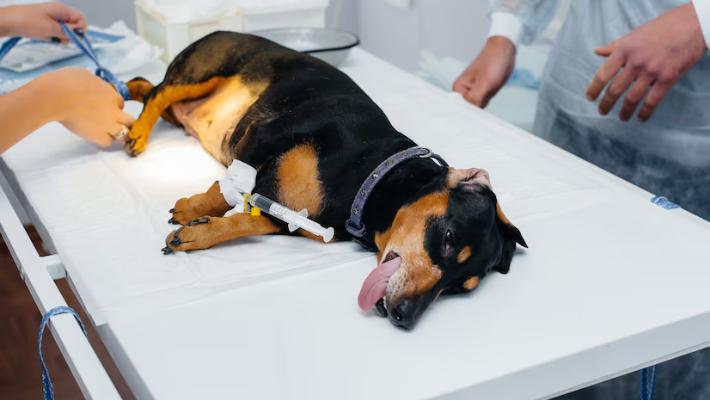Guide To Recognizing & Managing German Shepherd Hip Dysplasia


German Shepherds are one of the most popular dog breeds in the world, highly valued for their work ethic, ability to learn, and athleticism. Unfortunately, these majestic and highly intelligent dogs are prone to a genetic condition called hip dysplasia. It can cause a lot of pain and significantly affect their mobility and, as a result, their quality of life.
So, whether you have recently brought home a German Shepherd pup or have been a GSD parent for many years, it is important for you to know the causes and recognize the signs of Hip Dysplasia. This will help you manage your dog’s condition effectively and ensure it leads a happy, active life.
In this comprehensive guide, we will explore the causes, symptoms, treatment options, and prevention methods to help your German Shepherd thrive despite this condition.
What Is Hip Dysplasia In Dogs?
Hip dysplasia in dogs, also known as canine hip dysplasia, is a common orthopedic condition that affects dogs, including German Shepherds. It occurs when the hip joint in a growing puppy develops abnormally, causing either the socket to be shallow or the ball to be improperly shaped. This, in turn, leads to improper alignment between the ball and socket in one or both hips.

In plain words, hip dysplasia causes the hip socket in the dog’s pelvis to become loose. As a result, the ball (the femoral head) does not fit in properly. So, instead of fitting in snugly and creating a smooth movement as it should, the femoral head rubs and grinds against the socket joint, causing wear and tear on the joint, resulting in pain, inflammation, and restricted movement.
Over time, it leads to loss of cartilage, formation of painful bone spurs (osteophytes), and eventual loss of function. It is important to note that while hip dysplasia is more prevalent in large and giant breed dogs like the German Shepherd, it can also affect smaller breeds.
Understanding The Causes Of Hip Dysplasia in Dogs
Now that you have a working knowledge of hip dysplasia in dogs, let’s discuss the factors responsible for this condition. A combination of genetic and environmental factors, such as nutrition and growth, causes hip dysplasia in dogs. We have explained these factors in detail below.

Genetics
Genetics is the main culprit responsible for hip dysplasia in dogs. Some dogs, like the German Shepherd, are predisposed to this debilitating condition due to specific genes or variations inherited from their parents.
Moreover, unlike some diseases with a single gene mutation, hip dysplasia is polygenic in nature. This means that multiple genes are taking part, each with a small effect and contributing to the overall effect.
However, the exact genes involved and their interactions are still being researched. Furthermore, some studies suggest that German Shepherds might have specific gene combinations that increase their risk compared to other breeds. Inbreeding in the early days of the GSD’s history has increased these risk factors.
Rapid Growth
Rapid growth during the puppy phase is another contributing factor to hip dysplasia. Large breed puppies that grow too quickly may put excessive strain on their developing hip joints, leading to abnormal development. Overfeeding, particularly with a diet that is high in calories and calcium, can accelerate growth and increase the risk of hip dysplasia.
Excessive Weight Gain
Being overweight or obese can significantly increase the risk of hip dysplasia in dogs. The additional weight places extra stress on the hip joints, leading to joint instability and degeneration over time. Maintaining a healthy weight through a balanced diet and regular exercise can help reduce the risk.
Nutritional Factors
Improper nutrition during the puppy stage can contribute to the development of hip dysplasia. An unbalanced diet that lacks essential nutrients, including calcium, phosphorus, and vitamin D, can impair proper bone development and increase the likelihood of joint abnormalities.
Environmental Factors
Environmental factors, such as too much exercise on hard and slippery surfaces, can have an impact on the development of hip dysplasia. Intense or repetitive activities, particularly in young dogs whose joints are still developing, can increase the risk of joint damage and hip dysplasia.
Recognizing The Signs And Symptoms Of Hip Dysplasia In Dogs
Hip Dysplasia in dogs is quite a serious condition and can lead to joint instability and osteoarthritis if left untreated. However, detecting the condition early allows for more effective treatment and management, which can go a long way towards improving a GSD’s quality of life. Keep an eye out for the following signs that may indicate your German Shepherd is suffering from hip dysplasia:

Limping:
This can be occasional or chronic and may not always be on the same leg. The limping might appear after exercise or for no apparent reason.
Trouble Getting Up:
You might notice your dog struggling to rise from a sitting or lying position, appearing stiff or wobbly.
Reluctance To Climb Stairs Or Jump:
Activities that put stress on the hips, like climbing stairs or jumping on furniture, may become difficult or avoided altogether.
Bunny Hopping:
It is an abnormal gait in which the dog hops on both hind legs simultaneously rather than moving each leg independently in a trot.
Lethargy:
Pain can lead to decreased activity and a general lack of enthusiasm.
Reduced Playfulness:
Your dog might seem less interested in playing or engaging in activities they once enjoyed.
Vocalization:
Whimpering or yelping when touched around the hip area can indicate pain.
Abnormal Sitting Positions:
Some dogs with hip dysplasia may sit with their legs splayed out in a frog-like posture.
However, you should remember that these signs can vary a lot depending on the severity of the condition, which can be different for different breeds. Some dogs may not even display any symptoms of hip dysplasia until later on in life.
You also need to remember that other health issues can cause similar symptoms. That is why it is important to consult a veterinarian as soon as you spot these signs for a proper diagnosis.
Diagnosis And Treatment Of Hip Dysplasia In Dogs
If you have noticed recently that your German Shepherd is showing signs and symptoms that look sort of similar to hip dysplasia in dogs, then the first thing you need to do is consult a veterinarian.
The vet will perform a thorough physical examination at first to check for signs of pain, muscle loss, limping etc. They may also move your dog’s hind legs in different directions to check the range of motion and the degree of looseness of joints.

Along with a physical examination, your Vet will ask for your dog’s medical history and recommend additional diagnostic tests such as X-rays or joint fluid analysis. These tests will help determine the severity of the condition. We have talked about these tests in detail below:
X-rays: X-rays are the gold standard for diagnosing hip dysplasia. They allow visualization of the hip joint, revealing abnormalities like laxity (looseness), shallow sockets, or bone deformities. Depending on the dog’s age, different X-ray views might be needed.
Arthrography: A contrast dye is injected into the joint to highlight potential tears or abnormalities in the joint capsule or cartilage.
CT Scan or MRI: These advanced imaging techniques provide detailed 3D views of the joint but are typically used in complex cases or for surgical planning.
Treatment Of Hip Dysplasia
Based on the results of these tests and your dog’s age, the vet will determine how severe your dog’s condition is and suggest a suitable treatment plan. The most common treatment plans can be divided into two categories: The nonsurgical approach and the surgical approach. We have discussed these approaches in detail below:

Non Surgical Approach
Weight Management:
Maintaining a healthy weight is crucial. Excess weight puts extra strain on the hips, worsening pain and progression. Your veterinarian can recommend a suitable diet and exercise plan to help your dog achieve and maintain an ideal weight.
Exercise Restriction:
Limiting strenuous activity like jumping or running on hard surfaces can help reduce discomfort. Controlled walks and swimming (low-impact) are good alternatives.
Joint Supplements:
Glucosamine and chondroitin sulfate supplements can reduce the progression of hip dysplasia by helping promote cartilage health and reduce inflammation.
Physical Therapy:
Physical therapy techniques, such as hydrotherapy and therapeutic exercises, can help strengthen muscles surrounding the hip joint, improve stability, and maintain mobility.
Pain Medication:
Non-steroidal anti-inflammatory drugs (NSAIDs) can provide relief from pain and inflammation. Your veterinarian may prescribe these medications to manage your dog’s symptoms. Make sure to administer the correct dosage based on your dog’s size and weight.
Surgical Approach
In severe cases of Germa Shepherd hip dysplasia, where the dog experiencing severe pain and limited mobility, vets may recommend surgery. Here are some common hip dysplasia surgical options for dogs:

Total Hip Replacement (THR):
The most common surgery for advanced hip dysplasia. The damaged hip joint is replaced with artificial implants, offering significant pain relief and improved mobility.
Femoral Head Osteotomy (FHO):
This procedure, sometimes also known as femoral neck ostectomy, removes the femoral head (ball) from the socket, allowing scar tissue to form a pseudo-joint. It’s less invasive than THR, but it can limit mobility. However, the main objective of this procedure is to lessen the pain in dogs caused by hip dysplasia and improve their quality of life. This is why, FHO is considered to be a salvage procedure, as its primary goal is improving quality of life by reducing rather than restoring full function.
Juvenile Pubic Symphysiodesis (JPS):
JPS is also another minimally invasive procedure for young, growing dogs to influence the development of the hip joint and potentially prevent further dysplasia. This surgery aims to influence the growth of the pelvic bones in a way that promotes a deeper hip socket (acetabulum) and a better fit for the femoral head (ball of the thigh bone). This can help prevent the looseness and shallowness characteristic of hip dysplasia.
Triple/Double Pelvic Osteotomy (TPO):
Triple pelvic osteotomy (TPO) and double pelvic osteotomy (DPO) are surgical procedures performed on young or growing dogs with moderate hip dysplasia. The goal is to improve the fit of the hip joint and prevent the development of osteoarthritis later in life.
However, you should remember that there is no cure for hip dysplasia in dogs. The treatment options (surgical and non-surgical) we have mentioned here can only help manage the conditions and reduce your German Shepherd’s pain and discomfort.
Managing Hip Dysplasia in Dogs at Home
In addition to the above-mentioned treatment approaches for hip dysplasia in dogs, you also need to ensure that your German Shepherd has a comfortable and supportive environment at home. It will also help you to manage German Shepherd hip dysplasia in the long term. Here are some steps that you can take:

Comfortable Bedding
Create a comfortable and supportive sleeping space for your dog so that they can take a nap without suffering from additional pain or discomfort. Consider getting a dog bed with soft padding or an orthopedic dog bed that can offer proper support and pressure relief for your dog’s joints. You can also place rugs or non-slip mats in various places around the house to prevent slipping and falls that could worsen hip pain.
Ramps For Easy Access:
You can build ramps or stairs so that dogs can easily access any elevated areas around your house without any excessive strain on their joints. A ramp will also help your dog to easily get on and off the furniture, bed, and car instead of jumping and further straining their hips.
Final Thoughts!
Due to genetics, German Shepherds are more prone to hip dysplasia than any other breed. It can be challenging for German Shepherds in many ways, but early detection, timely diagnosis, and proper veterinary treatment can greatly improve your dog’s quality of life.
Moreover, by helping your German Shepherd to maintain a healthy weight through nutritious diet and proper exercise and creating a loving and caring environment at home, you can help them to live a long and happy life.
RECOMMENDED READING:








All Comments
14 May, 2024
Your blog is a treasure trove of valuable insights and thought-provoking commentary. Your dedication to your craft is evident in every word you write. Keep up the fantastic work!
Reply